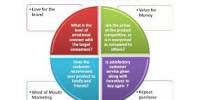Coaching could be a trained and practiced skill that helps high-performing employees set and reach personal goals that are in line with organizational objectives, taking their skills and leadership capabilities to the subsequent level.
Mentoring relies on the experiences of the mentor and focuses on the event of the mentee as a full person. Mentoring doesn’t require any specialized training and might be undertaken by anyone senior (or junior, in some cases) to the mentee.
In an organization, various employee development programs are undertaken, so as to raise their level of performance. Two such programs are coaching and mentoring. While coaching is the process of training and supervising a person to better their performance. On the other hand, mentoring refers to the counseling process carried on to guide and support a person for his career development.
International Mentoring Group (IMG) defines mentoring as, “A process of direct transfer of experience and knowledge from one person to another.” In the workplace, a mentor provides guidance and direction to a mentee usually a junior-level employee with similar interests who may aspire to the position of the mentor. The mentor has achieved success within the industry and voluntarily shares his or her expertise with the colleague.
The main purpose behind mentoring is to provide open and face to face communication between the mentor and mentee to assist an employee to achieve social & emotional maturity and effectiveness.
IMG also defines coaching as “a method of achieving set goals.” A coach, who may or may not be a company employee, helps clients achieve specific, immediate goals as defined by the organization.
Coaching is time-bound and well planned. The person who directs or instructs is thought as a coach while the one who is being directed is understood as coaches. Coaching helps in uncovering the professional capabilities of an employee, understanding their strengths and weaknesses, knowing their potential, building key skills, etc. which are helpful for the accomplishment of the organizational goals.
Key Differences between Coaching and Mentoring –
- In reality, coaching is most effective when used to reward high-performers, giving them space and guidance to set and achieve goals and become the best version of themselves at work.
- Mentoring can be appropriate in certain situations; however, it often lacks the structure of a good coaching program and can be inappropriate in situations when guidance from a professional coach would better serve the individual.
- Coaching is defined as help given by an expert to an individual for the improvement of his performance.
- Mentoring refers to an activity where a person guides a less experienced person.
- Coaching is performance-driven. The focus is on the present. The purpose is to improve, enhance, or acquire new skills that can be leveraged immediately.
- Mentoring is development driven. The focus is on the future. The mentor shares his or her experience in an effort to positively influence the personal and professional growth of the mentee.
- Coaching is well planned and structured. Coach imparts coaching.
- Mentoring is an informal one. The mentor provides mentoring.
- Coaching goals may also involve input from the organization, particularly where the organization has arranged for leadership coaching to occur. In other instances, the coach and coaches will work together to set goals specific to the coaches’ leadership capabilities.
- Mentoring goals are often much broader, and the ownership of goal setting often rests with the mentee. As mentoring goals can be less clearly defined, challenges and feedback surrounding these goals can be less impactful coming from a mentor with no formal coaching training.
- The coaching agenda is co-created by the coach and the coach in order to meet the specific needs of the coach.
- The mentoring agenda is set by the mentee. The mentor supports that agenda.
- Coaching has a defined ending. Parties may meet just once or over a period of time, however, the relationship usually terminates when the trainee masters the specific skill or goal they were working on.
- Mentoring requires a significant time commitment from both parties. Mentors and mentees may start out as casual acquaintances, but often build strong fellowships that can continue for years.
- Coaching aims at improving the performance of an employee.
- Mentoring aims at concentrates on career and all-round development of the employee.
- Coaching requires active engagement. A manager must monitor the progress, solicit regular feedback from the coach, and oftentimes determine when a coaching initiative should conclude.
- Mentoring requires little oversight. Although a manager may be assigned to administer the logistics of a mentoring program, formal supervision is rarely required. For the most part, mentors and mentees steer the direction of their relationship.
Coaching is helpful to both the coach and their organization. Coaching allows employees the time and guidance to figure on goals and enhancements relevant to their work, giving them increased confidence in their roles and their own ability. Coaches may also help their coaches to figure on more personal aspects, like work-life balance, which might see improvements to job satisfaction and overall happiness and health. While mentoring may produce less specific and measurable outcomes, it can be a valuable experience in overall improvement for the mentee. It may work best in situations where the mentee is looking for advice about how to navigate organizational politics and opportunities for progression within the organization or industry. Mentoring does however carry the risk that personal advice drawing from the mentors’ experiences may not be relevant to the mentee’s current situation, or may not relate to issues they are dealing with.
Coaching and Mentoring both play a vital role in today’s workplace. Counting on things, one could also be preferable over the opposite. All individuals need supervision and support at various stages of their life whether if it’s about their performance and efficiency or career and effectiveness. The final word goal is development must be there alternatively they’re going to lose their morale which can lead to a decrease of their efficiency and effectiveness. So, at periodical intervals, coaching and mentoring should be provided to the staff of a company or organization which is able to benefit the worker yet because of the entity too.
Information Sources:
















